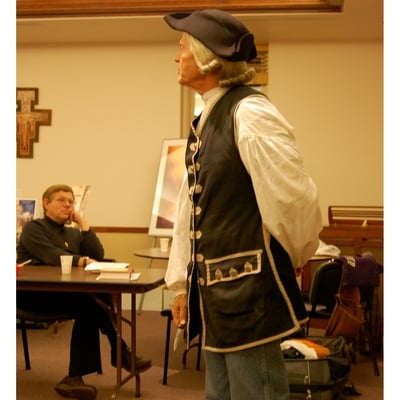As
if Wesley were speaking directly to our Biblically illiterate culture, and
sadly our almost as Biblically illiterate church, he stresses that pure ignorance is a major cause of spiritual
degeneration and apostasy. Here is
how he puts it….
Another general cause of this
darkness is ignorance; which is likewise of various kinds. If men know not the Scriptures, if they
imagine there are passages either in the Old or New Testament which assert,
that all believers without exception, must sometimes be in darkness;
this ignorance will naturally bring upon them the darkness which they expect.
And how common a case has this been among us! How few are there that do not
expect it! And no wonder, seeing they are taught to expect it; seeing their
guides lead them into this way. Not only the mystic writers of the Romish
Church, but many of the most spiritual and experimental in our own, (very few
of the last century excepted,) lay it down with all assurance as a plain,
unquestionable Scripture doctrine, and cite many texts to prove it…. “But
is not darkness much more profitable for the soul than light? Is not the work
of God in the heart most swiftly and effectually carried on during a state of
inward suffering? Is not a believer more
swiftly and thoroughly purified by sorrow, than by joy? — by anguish, and
pain, and distress, and spiritual martyrdoms, than by continual peace?” So
the Mystics teach; so it is written in their books; but not in the oracles of
God. The Scripture nowhere says that the absence of God best perfects his work
in the heart! Rather, his presence, and
a clear communion with the Father and the Son: A strong consciousness of this
will do more an hour, than his absence in an age. Joy in the Holy Ghost will
far more effectually purify the soul than the want of that joy; and the peace
of God is the best means of refining the soul from the dross of earthly
affections. Away then with the idle conceit, that the kingdom of God is divided
against itself; that the peace of God, and joy in the Holy Ghost, are
obstructive of righteousness; and that we are saved, not by faith, but by
unbelief; not by hope, but by despair!
What
Wesley is talking about here is precisely the Catholic teaching of St. John of
the Cross and his disciples that suggests that the dark night of the soul is
not merely normal, it could be good for your spiritual formation! Not so, says Mr. Wesley. This is an unbiblical notion. What would Wesley as a pastor have us do, if
we see someone in the process of committing moral apostasy or intellectual
apostasy? What would he have us do if a person is
stubborn about their sins, and refuses to repent or give them up? Listen carefully to what he says about
preachers who preach peace and mercy and compassion without any accountability
or repentance for sin….
Accordingly, they know and use but
one medicine, whatever be the cause of the distemper. They begin immediately to
apply the promises; to preach the gospel, as they call it. To give
comfort is the single point at which they aim; in order to which they say many
soft and tender things, concerning the love of God to poor helpless sinners,
and the efficacy of the blood of Christ. Now this is quackery indeed,
and that of the worse sort, as it tends, if not to kill men’s bodies, yet
without the peculiar mercy of God, “to destroy both their bodies and souls
in hell.” It is hard to speak of these “daubers with untempered
mortar,” these promise-mongers, as they deserve. They well deserve the
title, which has been ignorantly given to others: They are spiritual
mountebanks. They do, in effect, make “the blood of the covenant an
unholy thing.” They vilely prostitute the promises of God by thus applying
them to all without distinction. Whereas, indeed, the cure of spiritual, as of
bodily diseases, must be as various as are the causes of them. The first thing,
therefore, is to find out the cause; and this will naturally point out the
cure.
As
a good doctor of souls, Wesley says that one must be a good spiritual
diagnostician. If a person merely is
depressed, perhaps from losing a loved one, then there is occasion to preach
peace and offer comfort. But if their
subdued or diminished spiritual state has a root in sin, or ignorance, or even
idleness, then that is another matter.
The cures of ‘the wilderness state’ are as numerous as its causes—
outward or inward sin, deliberate or accidental sin, ignorance or sloth. On the
latter, following his Puritan forebears, Wesley stresses,
Perhaps it is this very thing, the
want of striving, spiritual sloth, which keeps your soul in darkness. You dwell
at ease in the land; there is no war in your coasts; and so you are quiet and
unconcerned. You go on in the same even track of outward duties, and are
content there to abide. And do you wonder, meantime, that your soul is dead? O
stir yourself up before the Lord! Arise, and shake yourself from the dust;
wrestle with God for the mighty blessing; pour out your soul unto God in
prayer, and continue therein with all perseverance! Watch! Awake out of sleep;
and keep awake! Otherwise there is nothing to be expected, but that you will be
alienated more and more from the light and life of God.
From
this quotation you can see clearly how much Wesley believed in an active
approach to spiritual formation, but at the same time he wanted a whole-hearted
not a half-hearted approach to the matter.
A going through the motions of outward rituals without heart religion
would not do. But at the same time, a
purely private and inward and mystical approach to spiritual formation was also
not a Wesleyan or Biblical approach.
Wesley
knew that at times, a Christian could suffer from heaviness, due to many trials
and temptations. The lamp light of joy
is burning low in such a situation, and to such a person, a word of reassurance
that no temptation has overcome a believer that is not common and can be
prevailed over (1 Cor. 10) is the appropriate medicine. The causes of darkness must be diagnosed
before the cures can be administered.
Perhaps most importantly of all, Wesley had an absolute abhorrence of
those who, like Job’s comforters, would want to ascribe every trial in life to
God himself, including even the dark night of the soul.
No,
says Mr. Wesley, God does not willingly withdraw from anyone, and darkness is
not something that strengthens one’s spiritual character. On the contrary it
weakens it. Love, joy, peace patience,
kindness, in other words the fruit of the Spirit are what forms us spiritually
from the inside out. While trials and
temptations may test our character, the
inward work of the Spirit and the outer partaking of the grace and knowledge of
God through the Word and the sacraments are the normal means of spiritual
formation, the means of strengthening our
spiritual character which certainly has as much do with what we do together as
Christians, as with what we do when we are alone with our God.
No
wonder Paul said in good southern fashion— “ya’ll work out ya’lls salvation
with fear and trembling for it is God who works within all ya’ll to will and to
do.” Notice these last two verbs—- God
empowers the willing and doing of God’s good works and purposes on earth. God
doesn’t just inspire good intentions, he enables willing and doing, he enables
the obedience of faith, without which spiritual formation cannot properly or
fully transpire for what God intends by spiritually forming us is to make us
his holy and loving people, joined together in harmony as one body of Christ,
at peace with one another, and experiencing wholeness, wellness, in our life
together as the church.

